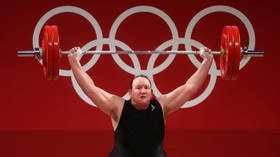Athletics bosses set to rule on trans participation changes

International track and field governing body World Athletics is set to rule in March on changes which could tighten the requirements for participation by transgender athletes but still allow a route for them to compete, according to reports.
UK newspaper The Telegraph has reported that a “preferred option” has been proposed under which the amount of plasma testosterone for transgender female competitors would be capped at 2.5 nanomoles per liter, which is exactly half the current limit.
However, the amount of time an athlete would need to remain below that level would be increased to two years – double the current requirement.
“Putting forward a preferred option is the best way to gather constructive feedback, but this does not mean this is the option that will be presented to [World Athletics] Council or indeed adopted,” the organization said in a statement.
It was reported by The Guardian, which says it has seen a consultation document, that World Athletics accepts that athletes who have transitioned from male to female “retain an advantage in muscle mass, volume and strength over cis women after 12 months [of hormone treatment]” and that “limited experimental data” suggests advantages continue even after that period.
In July of last year, World Athletics president Sebastian Coe hinted at a more stringent stance, saying he was “really over having any more of these discussions with second-rate sociologists who sit there trying to tell me or the science community that there may be some issue.”
“Testosterone is the key determinant in performance,” added Coe, who has vowed to protect “the integrity and future of women’s sport.”
Last year, international swimming governing body World Aquatics (formerly FINA) said it was banning trans participation in women’s events for athletes who have completed any part of male puberty, instead promising to create a new ‘open’ category. Federations in sports such as rugby have also imposed more stringent measures.
The International Olympic Committee (IOC) has promoted inclusivity while widely being seen as passing the buck to individual sporting federations to rule on the matter.
The issue of trans participation in female sport remains a contentious one, not least after athletes such as trans US college swimmer Lia Thomas broke a series of records with her performances for the University of Pennsylvania in 2021 and 2022.













